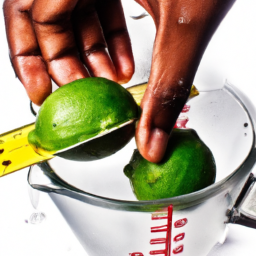As a fan of orange juice, I appreciate the importance of beginning your day with a glass that is both refreshing and delicious. However, there are times when we may forget to put it in the fridge or leave it out for too long. This raises the question, how long can orange juice be left out before it goes bad?
The answer is not as simple as you may think. There are several factors that can affect the shelf life of orange juice, including the type of juice, packaging, and storage conditions.
In this article, we will explore these factors and provide you with the information you need to ensure your orange juice stays fresh and safe to drink.
Key Takeaways
- Orange juice should not be left out of refrigeration for more than 2 hours to avoid spoilage.
- Proper storage of orange juice involves using an opaque/dark container, refrigeration, and protection from light and air exposure.
- Signs of spoilage include sour/rancid smell, strange taste, cloudy appearance, and visible mold growth.
- Freezing can extend shelf life and preserve nutrients/flavors, but thawed orange juice should be used within a few days and never refrozen.
Factors that Affect Orange Juice Shelf Life
Hey, did you know that factors affecting shelf life of orange juice include storage conditions like temperature, exposure to light and air, and the type of container?
When orange juice is exposed to light and air, it can cause oxidation which can lead to spoilage. This is why it’s important to store orange juice in an opaque or dark container and in a cool, dry place away from direct sunlight.
The temperature at which orange juice is stored is also crucial in determining its shelf life. If the juice is stored at room temperature, it can only last for a few hours before it starts to spoil. However, when stored in the refrigerator at a temperature below 40°F (4°C), orange juice can typically last for up to seven days.
The type of container used to store the juice can also affect its shelf life. Airtight containers are generally recommended as they help to keep the juice fresh for longer periods.
With these factors in mind, it’s important to refrigerate your orange juice as soon as possible after opening to extend its shelf life.
The Importance of Refrigeration
Refrigeration is essential for preserving the freshness and quality of perishable items, just like how a musician must tune their instrument to produce beautiful music.
Orange juice is no exception to this rule, as it is highly perishable and prone to spoilage. Proper storage and temperature control are crucial to extend the shelf life of orange juice.
When orange juice is left at room temperature for an extended period, it can quickly develop harmful bacteria that can cause foodborne illnesses. Refrigeration slows down the growth of bacteria and other microorganisms, which can keep the juice fresh for a longer time.
The ideal temperature for storing orange juice is between 32 and 40 degrees Fahrenheit. It’s also important to keep the orange juice container tightly sealed to prevent moisture and air from entering.
Proper storage and temperature control can help to ensure that your orange juice remains fresh and safe to consume.
As important as it is to know how to properly store orange juice, it’s equally essential to recognize when it has gone bad. In the next section, we’ll discuss some of the signs that indicate orange juice has spoiled.
Signs that Orange Juice has Gone Bad
If you’ve noticed a funky smell or strange taste, it’s likely that your orange juice has gone bad. Spoilage is a natural process that occurs when microorganisms start to break down the juice, causing it to ferment and become sour. While drinking spoiled orange juice isn’t necessarily harmful, it can cause stomach upset and diarrhea.
Here are some signs that your orange juice has gone bad:
- The juice has a sour or rancid smell.
- The juice has a strange taste or has developed a bitter aftertaste.
- The juice appears cloudy or has visible mold growth.
- The expiration date on the carton has passed.
To prevent spoilage, it’s important to store orange juice properly. Keep it refrigerated at all times and consume it within a week of opening. If you don’t plan on drinking the juice within a week, freeze it in an airtight container. This will help to preserve its freshness and flavor.
Now, let’s move on to the next section and explore how long unopened orange juice can be left out before it goes bad.
How Long Can You Leave Unopened Orange Juice Out?
Congratulations, you’re a risk-taker with a devil-may-care attitude towards leaving your unopened citrus beverage exposed to the elements. But let’s talk about the shelf life of unopened orange juice.
The shelf life of orange juice is typically between 6 and 12 months, depending on the manufacturer and storage conditions. Most orange juice cartons or bottles have an expiration date printed on them, which indicates the date by which the juice should be consumed for optimal quality and freshness.
However, if you leave unopened orange juice out of the refrigerator for an extended period, it can spoil before its expiration date. The temperature at which the juice is stored and the length of time it is left unrefrigerated are critical factors that determine its shelf life.
It’s best to always store unopened orange juice in the refrigerator and consume it before the expiration date. In the next section, we’ll discuss how long you can leave opened orange juice out of the refrigerator.
How Long Can You Leave Opened Orange Juice Out?
You may be surprised to learn that the flavor and safety of your opened orange juice can be compromised if left unattended for a certain period of time. Once opened, orange juice starts to lose its shelf stability and is susceptible to microbial growth.
If left out at room temperature for more than two hours, the juice can become a breeding ground for harmful bacteria. The best practice is to refrigerate the juice as soon as it is opened, and consume it within seven days.
It’s also important to keep the juice in a tightly sealed container to prevent exposure to air, which can cause oxidation and spoilage. By properly storing your orange juice, you can ensure its safety and freshness.
Now that we’ve covered the importance of proper storage, let’s move on to some tips for properly storing orange juice.
Tips for Properly Storing Orange Juice
To ensure the optimal freshness of your orange juice, it’s essential to follow some simple tips for proper storage.
First and foremost, use a proper container. Orange juice should be stored in an airtight container that can prevent oxygen from entering and spoiling the juice. Additionally, the container should be made of glass or plastic, as these materials are non-reactive and won’t affect the flavor of the juice.
Temperature control is also crucial in maintaining the quality of orange juice. It’s best to store orange juice in the refrigerator at a temperature between 33-40°F. Avoid keeping the juice at room temperature as it can promote the growth of bacteria and mold, which can spoil the juice.
Following these simple tips can help prolong the freshness of your orange juice and ensure that you can enjoy it for as long as possible.
As for the next section, let’s explore whether freezing orange juice is a viable option.
Can You Freeze Orange Juice?
I’ve been curious about freezing orange juice for a while now, so I did some research on the topic.
Based on what I learned, freezing orange juice is a simple process that involves pouring the juice into an airtight container and placing it in the freezer.
Thawing the juice is also straightforward, as you can simply place the container in the refrigerator and wait for it to defrost.
Freezing Process
When freezing orange juice, it’s important to leave some room at the top of the container for expansion. This is because when liquid freezes, it expands and can cause the container to crack or burst. By leaving some space, you can prevent this from happening and ensure that your frozen orange juice stays in good condition.
There are several benefits of freezing orange juice. First, it can extend the shelf life of the juice, allowing you to enjoy it for a longer period of time. Additionally, freezing can help to preserve the nutrients and flavors of the juice, making it a healthier and more delicious option.
To ensure optimal freezer storage, it is recommended that you store the juice in airtight containers or freezer bags and label them with the date of freezing. This will help you keep track of how long the juice has been in the freezer and ensure that you use it before it starts to degrade.
Now, let’s move on to the thawing process.
Thawing Process
As you eagerly anticipate a refreshing glass of orange juice, the thawing process is essential to ensure that the juice retains its flavor and nutrients. There are a few thawing methods that you can use, but the best one is to let the juice thaw in the refrigerator. This method avoids sudden temperature changes that can damage the juice and allows it to thaw slowly and evenly.
It’s important to note that you shouldn’t thaw orange juice at room temperature, as this can promote bacterial growth and spoil the juice. If you’re in a rush and need to thaw orange juice quickly, you can place the container in a bowl of cold water. Change the water every 30 minutes until the juice is thawed. However, this method should only be used as a last resort, as it can still cause the juice to lose some of its flavor and nutrients.
Regardless of the method you choose, make sure to use the thawed orange juice within a few days and never refreeze it once it’s been thawed.
When it comes to storing orange juice, there are alternative methods that can help extend its shelf life. One of these methods is to freeze the juice in ice cube trays and store the cubes in a freezer bag. This allows you to thaw only the amount of juice you need, reducing waste and keeping the rest of the juice frozen.
Another option is to store the juice in a vacuum-sealed container, which can help prevent oxidation and extend the juice’s freshness.
Alternative Storage Methods
Storing orange juice in a vacuum-sealed container or freezing it in ice cube trays are great options for keeping it fresh for longer periods of time. Vacuum sealing removes the oxygen from the container, which slows down the oxidation process that causes the juice to spoil.
Glass bottles are also a good option for storage because they don’t react with the acidic juice, unlike plastic containers that can affect the taste. When storing in a glass bottle, make sure to fill it to the top to minimize the oxygen exposure.
Another alternative storage method is to freeze the orange juice in ice cube trays. This allows you to easily portion out the amount you need and prevent waste. Once the juice is frozen, transfer the cubes to a freezer-safe container and label it with the date to ensure freshness. However, keep in mind that freezing can affect the texture and taste of the juice, so it may not be the best option for those who are particular about the quality of their orange juice.
It’s important to remember that while these methods can extend the shelf life of orange juice, they don’t guarantee its safety. It’s essential to practice proper hygiene and food safety measures to prevent the growth of harmful bacteria.
Orange Juice Safety and Hygiene
To ensure the safety and freshness of your orange juice, it’s important that you practice proper hygiene and food safety measures. This includes washing your hands before handling the juice, using clean utensils and containers, and storing it properly in the refrigerator.
Additionally, it’s important to consume orange juice at the right time to get the most nutrition benefits and avoid potential drawbacks. Orange juice is a great source of vitamin C, folic acid, and potassium. However, it can also be high in sugar and calories, which can contribute to weight gain and other health issues if consumed in excess.
To get the most out of your orange juice, it’s recommended to consume it in the morning when your body is best able to absorb the nutrients. It’s also important to limit your intake to one glass a day and to opt for freshly squeezed or 100% orange juice rather than those with added sugars or preservatives.
By practicing good hygiene, proper storage, and mindful consumption, you can enjoy the many benefits of orange juice while minimizing any potential drawbacks.
Frequently Asked Questions
What are the health benefits of drinking orange juice?
Drinking orange juice is an excellent way to boost your immune system and get a healthy dose of Vitamin C. It’s one of the best sources of the vitamin, which can help fight off infections and improve overall health.
How much orange juice should you drink per day?
As a nutritionist, I recommend drinking 8-12 ounces of fresh orange juice per day for its vitamin C and potassium benefits. However, excessive intake can lead to high sugar intake and possible weight gain. It’s important to balance the benefits and risks.
Can you mix expired orange juice with fresh orange juice?
Mixing expired orange juice with fresh juice is a recipe for disaster. The potential risks include food poisoning and other health implications. It’s important to discard old juice and always use fresh juice to ensure optimal health.
Is it safe to drink orange juice after it has been left out overnight?
It is not safe to drink orange juice left out overnight due to oxidation effects. Refrigeration options should be used to prevent bacterial growth. Always discard any perishable food left at room temperature for more than 2 hours.
What is the best way to clean and store a juicer used to make orange juice?
Ah yes, the eternal question of juicer maintenance. Fear not, I have the answers. Proper cleaning tips include disassembling and hand-washing all parts, while proper storage involves keeping it in a cool, dry place. Simple enough, right?
Conclusion
In conclusion, the shelf life of orange juice is greatly affected by various factors such as temperature, exposure to air, and the presence of contaminants. As a result, it’s important to properly store orange juice to maintain its freshness and quality.
When left unopened, orange juice can be kept outside the refrigerator for up to a week, but once opened, it should be consumed within 2-3 days. Furthermore, proper storage techniques such as refrigeration and freezing can significantly extend the lifespan of orange juice.
It’s also imperative to pay attention to the signs of spoilage and discard any orange juice that has gone bad. In essence, orange juice is a fragile beverage that requires careful handling and storage to ensure its safety and hygiene. As the saying goes, "Like a delicate flower, orange juice should be treated with care"…and enjoyed in its optimal state for maximum freshness and flavor.









